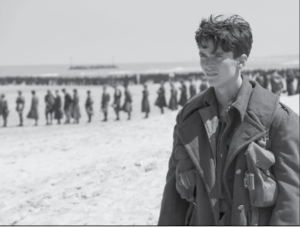![]() Reared by bookworm parents to love history, I wanted to see the movie “Dunkirk” as soon as I knew a film was forthcoming.
Reared by bookworm parents to love history, I wanted to see the movie “Dunkirk” as soon as I knew a film was forthcoming.
I was more eager still that Christopher Nolan, who plays Batman in “The Dark Night” (2008). I still maintain is the most important cultural document over the last 25 years, was directing the project. So with high hopes, I watched “Dunkirk” develop into something unexpected in its three vantage points whose intersection portrayed the miracle often credited with saving western civilization.
I do not overstate that claim. In early June 1940, the British Expeditionary Force, along with some of the collapsing French army, found itself pinned against the coast by superior German arms. As a map that came unto one British soldier, Tommy, played by Fionn Whitehead, indicated, the already

decimated Allies were “surrounded” with only the beach separating them from the world’s best military. At the same time, a flotilla of ships has set sail to try to save as many Allied soldiers as possible. With combat now shifted mostly to the sky, Royal Air Force Pilot Farrier, played by Tom Hardy and two other comrades, engage the Luftwaffe so that the craft at sea might make it to Dunkirk.
Nolan accomplishes these three action lines by mixing them in tension with scenes of horrifying death and, as with one British boat captain, Mr. Dawson, played by Mark Rylance, a stoic heroism that simply inspires awe. Portraying a narrator of sorts, Kenneth Branagh adds star power as the Naval Commander who supervises the men boarding the ships, and by sacrificing himself by remaining behind to rescue as much of the French Army as possible.
Nolan, however, did not direct a documentary any more than he portrayed a superhero in his Batman trilogy. By using an episode upon which history was literally, in Winston Churchill’s later recounting, on a “hinge of fate,” Nolan asks us in 2017 what it is that “has us surrounded.” Nolan’s question, like that facing the Allies in 1940, may seem cryptic, but it still requires us to give an answer.

